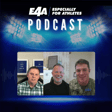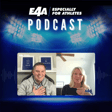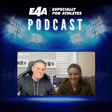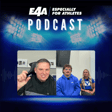
147. Sam Merrill on Confidence, Work, and Being a Great Teammate
This week’s episode features NBA player and Utah State legend Sam Merrill. His journey—from quiet gym hours to big-stage moments—reminds us that greatness grows from daily choices. Sam’s counsel hits three Especially for Athletes principles head-on: Be Resilient, Win the Hour, and Seek to Bless, Not to Impress. Here are a few highlights to discuss with your team or family—and a link to the full conversation at the end.
1) Be Resilient: Build Macro Confidence
Sam distinguishes between the ups and downs of a single shot and the deeper trust built over months and years.
“I’m a very macro confident person… my confidence game to game or shot to shot can go up and down, but I’ve always felt so confident in the work I’m putting in—that it’s going to pay off… During those years where I wasn’t sure it was going to work out in the NBA, I felt very confident it would work out somewhere because I put in the work.” E4A Takeaway: Resilience isn’t pretending every moment feels great. It’s choosing to keep working when the results are delayed. Believe in the process you control.
2) Win the Hour: Choose “Want-To” over “Have-To”
Sam’s separator isn’t a secret drill—it’s the intention behind every rep. “Are you going to the gym because you have to… or because you want to get better and get something done? I’ve played with guys who are there because they have to be, and guys who are there because they want to be. I always felt like I wanted to be there—and still do.” E4A Takeaway: Before each workout, decide your purpose. Go to get something done. Stack intentional hours—one by one—until the pattern becomes your edge.
3) Seek to Bless, Not to Impress: Be a Selfless Teammate
Even at the highest level, teams thrive when players choose people over ego.
“Being a good teammate is being as selfless as you can be… Ask yourself: ‘Am I being selfless for my teammates? Is this helping all of us, not just me?’ I’ve had great teammates—Jrue Holiday was an insanely good human… And with Donovan Mitchell, he cares about everybody, communicates, understands what role players go through.” E4A Takeaway: Your influence is bigger than your box score. Use your voice and your energy to lift others. That’s leadership that lasts.
Why This Matters Sam’s message fits the heart of Especially for Athletes: develop confidence through consistent work, be intentional with every hour, and value people over praise. That’s how sports become a tool for character—not just a chase for achievements.
🎧 Listen to Podcast #147 with Sam Merrill — hear the full conversation and share it with an athlete, teammate, or coach. Available wherever you listen to podcasts.
####
Especially for Athletes:
- Website: https://e4a.org
- Facebook: https://www.facebook.com/EspeciallyForAthletes/
- X: https://x.com/E4Afamily
- Instagram: https://www.instagram.com/especiallyforathletes/
- YouTube: https://www.youtube.com/channel/UCmbWc7diAvstLMfjBL-bMMQ
Join the conversation using #TheSportlightPodcast
####
Credits:
Hosted by Shad Martin & Dustin Smith
Produced by Shad Martin and IMAGINATE STUDIO









